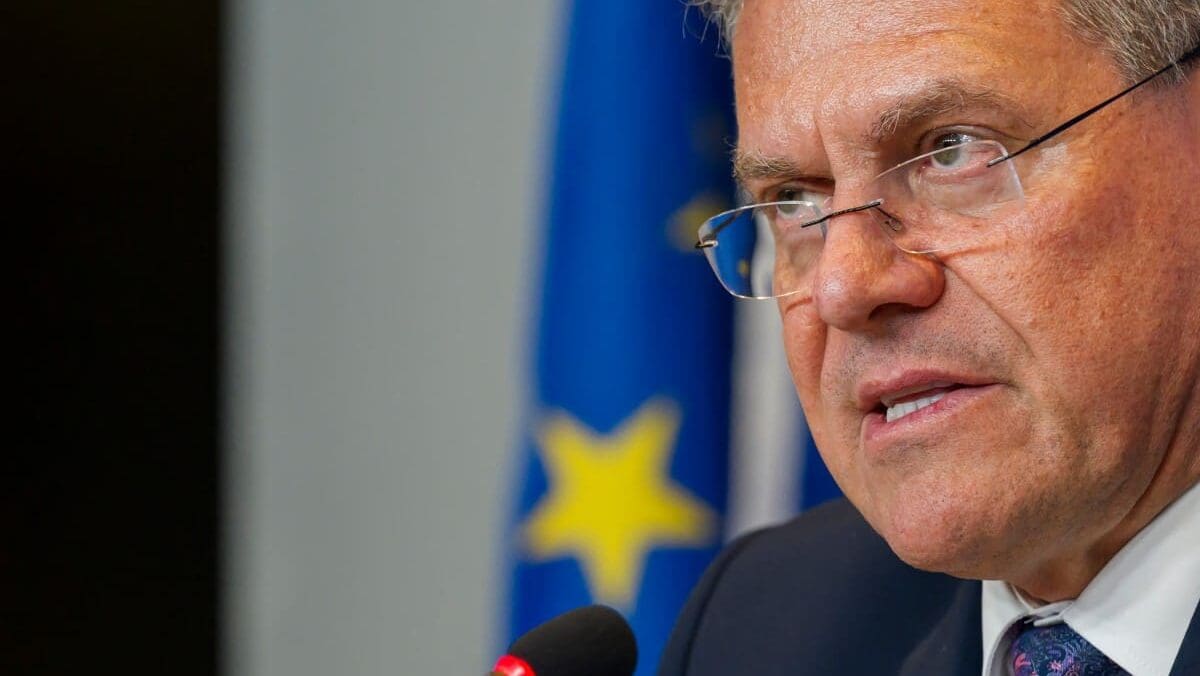
EU Commissioner for Trade and Economic Security, Interinstitutional relations and Transparency Maroš Šefčovič attends a press conference at the EU Council building in Luxembourg on April 7, 2025.
Photo: Jean-Christophe Verhaegen / AFP
The escalating trade war between the United States and the European Union has reached a critical juncture, with EU Trade Commissioner Maroš Šefčovič meeting Commerce Secretary Howard Lutnick and Trade Representative Jamieson Greer in Washington on April 14, 2025, hoping to defuse the tariff conflict.
In D.C., met with Secretary @howardlutnick and Ambassador @jamiesongreer for 🇪🇺🇺🇸 negotiations, seizing the 90-day window for a mutual solution to unjustified tariffs. 1/2 pic.twitter.com/P0eMgZSudQ
— Maroš Šefčovič🇪🇺 (@MarosSefcovic) April 14, 2025
Trump’s announcement of a 90-day tariff pause, reducing universal tariffs to 10%, offered a window for dialogue, prompting the EU to suspend planned retaliatory measures until July 14. Šefčovič emphasized the need for a “significant joint effort” to achieve a fair deal, reiterating the EU’s offer of zero tariffs on industrial goods and cooperation on non-tariff barriers.
This trade dispute, which affects 70% of EU exports to the U.S., could shave 0.2-0.6% off the EU’s GDP if unresolved, with even more significant economic fallout projected for the U.S. Despite three visits to Washington since the conflict began, Šefčovič has yet to secure a breakthrough, as U.S. tariffs on steel, aluminum, cars, and components (up 25%) and reciprocal tariffs (20% on EU goods) persist. The EU’s cautious response reflects its preference for negotiation over escalation, but the clock is ticking.
Amid these tensions, Germany’s incoming chancellor Friedrich Merz has proposed reviving the Transatlantic Trade and Investment Partnership (TTIP). This comprehensive free-trade agreement has been stalled since Trump halted negotiations in 2017. The TTIP aimed to eliminate tariffs, harmonize regulations, and boost investment across the Atlantic, promising billions in economic gains. However, it faced backlash over issues like regulatory sovereignty, ultimately collapsing.
In a Handelsblatt interview, Merz called the failure to finalize TTIP a “mistake” and advocated for a new deal with “zero tariffs for everything,” aligning with sentiments from Trump ally Elon Musk. Merz plans to visit Washington post-inauguration in May 2025 to push this agenda while urging Europe to diversify trade with partners like Canada, India, and Japan.
Merz’s proposal dovetails with Šefčovič’s tariff-free offer but faces hurdles: Trump’s protectionist stance, EU internal divisions, and past TTIP controversies. While Merz insists Europe must speak with one voice, his call for rapid agreements, including with Mercosur, highlights a broader strategy to counter U.S. pressure. As Šefčovič navigates immediate tariff talks, Merz’s TTIP vision signals a long-term bid to reshape transatlantic trade.
